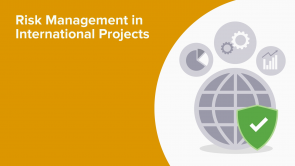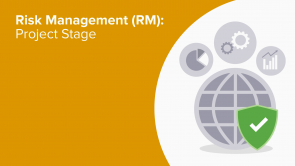Abstract of Project Stage

Über den Vortrag
Der Vortrag „Abstract of Project Stage“ von Simone Hoferer ist Bestandteil des Kurses „Risk Management (RM): Project Stage“. Der Vortrag ist dabei in folgende Kapitel unterteilt:
- Introduction
- Project phases
- Purpose of risk management
- What is a risk?
- Risk management process
- Risk categories
- Responsibilities in planning stage
- Production & sourcing
- Transport & logistics
- Installation & launching
- After returning home
- Crisis management
- Further training offers
Quiz zum Vortrag
What are the phases of international projects?
- Definition/ offer, planning/ engineering, production/ sourcing, transport/ logistics, installation/ launch, delivery & handover and warranty
- Demolition/ offer, planning/ engineering, production/ sourcing, transport/ logistics, installation/ launch, delivery & handover and warranty
- Definition/ offer, planning/ engineering, proposal/ sourcing, taxi/ logistics, installation/ launch, delivery & handover and warranty
- Definition/ offer, planning/ engineering, production/ sourcing, transport/ logistics, instruction/ launch, delivery & handover and warranty
What is a risk?
- It is an event in the future.
- It holds uncertainty about its outcome.
- It is either negative or positive concerning the goal of the project.
- It is an opportunity.
- It is never positive because it represents a problem.
What are the essential elements of risk management?
- Risk management planning, identification, assessment & evaluation, action planning, controlling & monitoring and communication
- Risk management playing, identification, assessment & evaluation, action planning, controlling & monitoring and communication
- Risk management planning, implementation, assessment & evaluation, action planning, controlling & monitoring and communication
- Risk management planning, identification, assessment & evolution, action planning, controlling & monitoring and communication
What is the key method of risk management?
- To ask the right questions, e.g. the 7 W-method
- To find the right answers, e.g. the triple A method
- To coordinate and to communicate risks
- To use as minimum resources as possible
What are typical categories/areas to look out for risks and opportunities?
- Company, country, customer, supplier and project
- Cooperation, country, customer, supplier and project
- Company, country, customer, supplier and project manager
- Company, country, customs, supplier and project
What are the main responsibilities during planning stage? They are ...
- to plan and define in a concrete and workable way: technical / content, to clarify and define details and to prepare detailed planning for timelines, costs and resources.
- to cut the planning stage as short as possible and to start as soon as possible with the real project management like production and sourcing.
- to finalize the action measures for risks and opportunities and to control them.
- to plan and define the costs and the terms of withdrawal. Make it a workable way by addressing the details and risks.
The goods have arrived and everything is ready. What should you keep in mind during the installation and the launching?
- Foster reliable intercourse with your customers and hand local interests diplomatically.
- Check the delivery immediately at the arrival of the goods and check for clean and neat clothing.
- Be creative when solving problems and arrange for installation tools and material up ahead.
- Be sure to handle interactions in your way and stick to the behavior of your culture.
- Be quick and neat when dealing with suppliers.
Which of the following steps of crisis management are wrong?
- Te develop strategies to cooperate with the crisis and to initiate & monitor countermeasures
- To identify, to assess, to develop appropriate strategies to cope and to initiate & monitor countermeasures
- To identify, to assess, to develop appropriate strategies to cope and to report
- To develop appropriate strategies to cope and to initiate & monitor countermeasures
What may be helpful approaches to solve problems?
- Solve problems as long as they are small.
- Behind each difficult behaviour lies a positive intention, which cannot be shown in a better manner.
- If something does not work, try something else instead.
- Ignore problems as long as possible. In most of the cases they will dissolve by themselves.
- Solve problems when they are getting big.
Kundenrezensionen
4,0 von 5 Sternen
| 5 Sterne |
|
0 |
| 4 Sterne |
|
1 |
| 3 Sterne |
|
0 |
| 2 Sterne |
|
0 |
| 1 Stern |
|
0 |
1 Kundenrezension ohne Beschreibung
1 Rezensionen ohne Text
Auszüge aus dem Begleitmaterial
-
... project stage Successfully managing ...
-
... However shouldn´t we be a little ...
-
... System. Business Coach, trainer ...
-
... projects in more than 30 countries. Working and living in USA and Iran ...
-
... international projects: Intercultural competence, Good language skills (minimum English) and understanding for language difficulties, High flexibility ...
-
... when? > timetable, deadline, completion, where? > destination country, transit countries * Compare with „the ...
-
... big, too complex, technically too tricky, too ambitious, misjudged, country: political, legal, culural, social, linguistical, logistical, overall security ...
-
... planning for timelines, costs, ressources •Define processes and proceedures. Create detailed demand planning (internal & external) ...
-
... Research material, choose suppliers. What do we source in home country or locally? ...
-
... Arrange heavy load or excess length transports transport/ special packaging for hazardous goods ...
-
... Requires intercultural understanding. Diplomatic handling of local interests. Foster reliable intercourse with customer ...
-
... a written form & with fotos, insist on customer signature. Generate a list of shortcommings, ...
-
... returning home: Prepare provisional project closure. Prepare final invoice & monitor it ...
-
... whenever necessary, not only scheduled. Create a attitude & habit to conduct RM. RM process steps are differnt perspectives ...
-
... Crisis management: Systematic handling of crisis: > identify > assess > ...
-
... Behind a each difficult behaviour lies a positive intention, which cannot be shown in ...
-
... problems (2): We are meeting on face level (appreciation/ respect). There is no perfect project ...
-
... raise awareness for the issue. Create positive habits and natural practise of RM. ...
-
... risks and opportunities during follow- up care > There are also compact trainings availabel for all three parts in ...
-
... Do you have questions, need some support or would like to share your feedback or exciting ...




